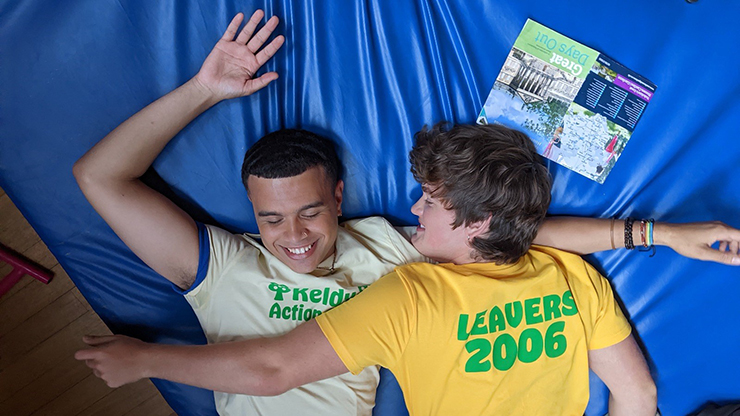
Samuel Paul Small as Max Marin and Joe Anders as George Bobbin as Max Marin in a scene from "Bonus Track." (Photo courtesy of Bankside Films)
It's good, folks. Damn good. But where's the audience?
The Miami Beach Pride Parade sashayed down Ocean Drive less than two weeks ago, but another local celebration of the LGBTQ+ community has burst onto movie screens. The 2024 Miami edition of the OUTshine Film Festival kicked off this Thursday, April 25, and is set to wrap up on Sunday, April 28. It pleases this critic to report that this year's lineup is taking no prisoners: eclectic, vibrant, stimulating.
This is one of the better showcases of world cinema in the quarter-century history of the event formerly known as the Miami Gay & Lesbian Film Festival. The assortment of features, docs and shorts provides the shot in the arm we so desperately needed. Its staggering breadth is cause for celebration and, it goes without saying, is infinitely more satisfying than what the recently wrapped 41st Miami Film Festival had to offer.
Kudos to Programming Director Joe Bilancio for delivering one winner after another. (I should know. As one of these year's jurors, I got a chance to see over a dozen films.) He truly is OUTshine's MVP.
And yet, there's a bitter irony that's threatening to dampen the fun. One of the strongest lineups has been unspooling in auditoriums that, well, can't be described as full. Reports from people who went this past weekend describe festival selections playing to audiences that barely make the double digits. That's not good. Not good at all.
The first impulse is to point to Miami Film Festival's decision to push their dates forward one month, from early March to early April, meaning this year's edition ended a mere five days before OUTshine's opening night: the Southeast premiere of the (unseen by me) Belgian-Canadian film “Turtles” (“Les tortues”), starring the great Olivier Gourmet, whom movie buffs will recognize as a regular in the films of Jean-Pierre and Luc Dardenne. MFF's programming team made the move ostensibly so they could be in a better position to pursue more titles that played at Sundance and South by Southwest, but it's clear the shift has unsettled the delicate ecosystem that enables these events to coexist in harmony.
While there is considerable overlap between both Miami and OUTshine's audiences, it is not absolute, so festival fatigue can't be the only explanation for this year's lower-than-expected turnout. The folks running OUTshine need to take a step back and reassess the elements that are preventing it from the being the best version of itself. Then they need to take action, so the festival can once again be that shining star on the South Florida arts calendar.
And guess what: there are still a few days to go, so it's not too late for those of you who haven't made it yet to make the effort and go. It's safe to say this is not the time to stay home if, like me, you care about this long-running queer cinema staple that has made such an impact since its inaugural edition in the summer of 1999. (Full disclosure: I worked for the festival in its early days, until 2005.)
I have been critical of OUTshine in the past, saying at one point that there was room to grow. In terms of its content, that growth has taken place. It's here. All it needs now is an appreciative audience of a size that's worthy of this festival and its legacy. So what are you going to do about it?
The proof, dear reader, is in the pudding. Let's take a brief look at five films showing between Thursday and Sunday. They're a representative sample of the rich diversity that the event encompasses. Let's dig in.
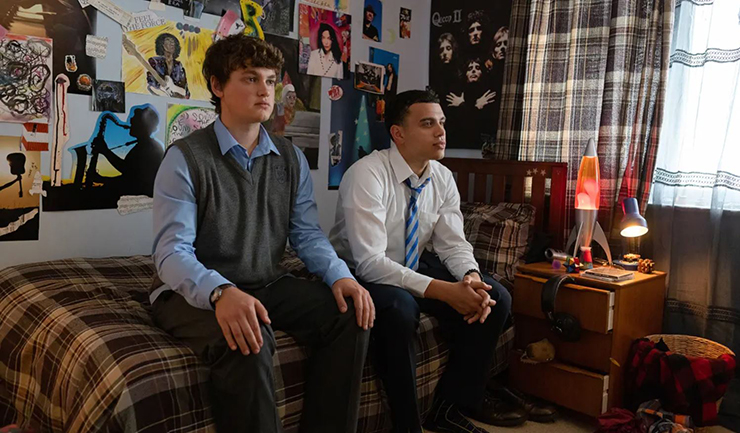
Joe Anders as George Bobbin and Samuel Paul Small as Max Marin in a scene from "Bonus Track." (Photo courtesy of Bankside Films)
“Bonus Track”: A coming-of-age/coming out comedy? Been there, done that. Or so you would think. This charmer from England shows there is still plenty of mileage left in ye olde boy-meets-boy formula. The trappings are familiar: gawky outsider finds his world turned upside down, mostly for the better, by the arrival of a cool new student at his secondary school (that's high school for us Yanks), circa 2006. Ah, but the devil is in the details, and this is where the movie's disarming eccentricities rise to the occasion.
The awkward, secretly winsome loner is George Bobbin (Joe Anders). Oh, sure, the 16-year-old's grades have plummeted and it's not even certain he'll be able to graduate, much to the consternation of his constantly bickering parents, Julia (Alison Sudol, terrific) and Jeffrey (the esteemed Jack Davenport), who are facing their own domestic crisis. Making matters even more dicey is George's insistence on putting all his eggs in one particular basket: winning the school's talent show, which of course will turn him into an instant superstar. Only thing is, no one thinks he has any musical talent, least of all his music teacher, Mr. Zeppelin (Ray Panthaki), who's had it up to here with George playing the same melody on the keyboard. Over and over.
Enter the suave, devastatingly handsome Max Marin (Samuel Paul Small), who has transferred to this school to be close to his mum. This small town community's interest is not just piqued because the new arrival is easy on the eyes. It's because his father is a pop icon who sent hearts afflutter a generation ago. And, for reasons that the school's snobs can't begin to figure out, he's taken a liking to George.
The two lads start working together on a song developed from George's melody and, well, you probably know where this is going. But even as “Bonus Track” hits the beats you expect it to, the way director Julia Jackman goes about it hews closer to a Christopher Guest mockumentary than, say, Netflix's phenomenal “Heartstopper,” though the hit series is definitely present in this film's DNA. A huge part of its appeal, apart from the uniformly strong cast, is Mike Gilbert's witty, tart-tongued screenplay, written from a story Gilbert developed with actor Josh O'Connor (“God's Own Country,” Netflix's “The Crown”), seen here in a brief but memorable cameo. He's the icing on this sponge cake, yet another highlight in this musically inclined tale of self-discovery, family ties and the bliss of a first kiss. Its affection for a suddenly lovestruck underdog shines like a beacon.
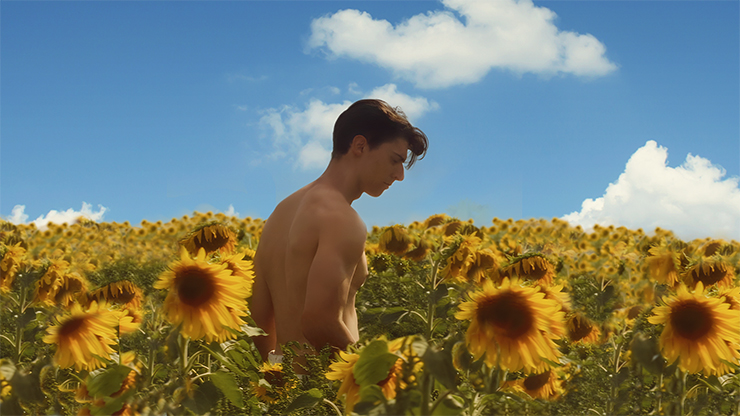
Liam Mollica as Leo in a scene from "Sunflower." (Photo courtesy of Pancake Originals)
“Sunflower”: This uncompromising foray into internalized homophobia and the corrosive effects of bullying, set in the suburbs of Melbourne, Australia, also charts a course across well-trod territory, but it manages to get under the skin all the same. A time period is not stated, but the online chat rooms it depicts suggest the late 1990s. Conversations with horny strangers are a reprieve for Leo (Liam Mollica), a teen who's still trying to hold onto the delusion that he likes girls but pines away for Boof (Luke J. Morgan), his reprobate bestie.
Boof is a bad boy, which is likely a part of why Leo, the son of Italian immigrants, finds him appealing. Whereas Monique (Olivia Fildes) finds Leo's boy-next-door appeal irresistible. (This cannot end well, can it?) Things take a violent turn in “Sunflower” after a nasty rumor catches fire, but writer-director Gabriel Carrubba, here making his feature directing debut, is ready to tackle this bruising story, with all its dark corners, head on. The 27-year-old filmmaker mixes the gritty kitchen sink realism in his depiction of his working-class milieu with lush dream sequences, gorgeously lensed by cinematographer Martine Wolff, that feature the titular blooms.
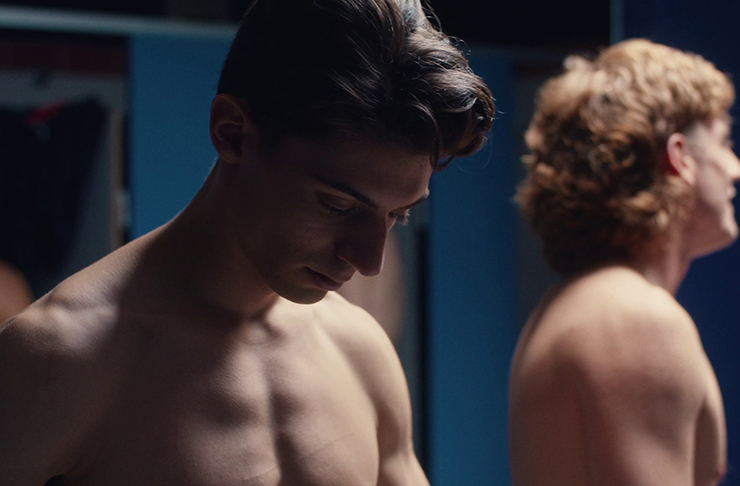
Liam Mollica as Leo and Luke J. Morgan as Boof in a scene from "Sunflower." (Photo courtesy of Pancake Originals)
In this unforgiving world, people can and do disappoint you, but they can also surprise you. Homophobia is so very ugly, Carrubba conveys with brusque immediacy but also with a wisdom beyond his years, but the most painful wounds are self-inflicted ones. Tough lessons, learned the hard way, but much like its title suggests, the outlook here is ultimately bright and clear, with some ominous storm clouds. The film's skillfully balanced tug of war between its ruthless and tender moments makes one grateful that it doesn't hold back, thankful that it pulls no punches.
“The Beautiful Summer”: This handsomely mounted costume drama from Italy turns back the clock to 1938 for another voyage of self-discovery. Ginietta (Yile Yara Vianello), Ginia for short, has moved to Turin from the country with her brother Severino (Nicolas Maupas). She works long days at an atelier making dresses, while he's vacillating as to whether or not he ought to continue his studies. While the country continues sliding toward fascism.
But writer-director Laura Luchetti, who is adapting Cesare Pavese's 1949 novel, is less interested in the deteriorating political climate, relegated to voices on the radio, than she is in the rising temperatures of her protagonist after she first sets eyes on Amelia. The film's best scene shows Amelia (Deva Cassel), statuesque and stunning, diving into the water from a boat, wearing nothing but her undergarments, so she can reach Ginia and her friends. She emerges like a nymph, and you understand why Ginia, a pragmatic workhorse determined to get ahead, would immediately become infatuated.
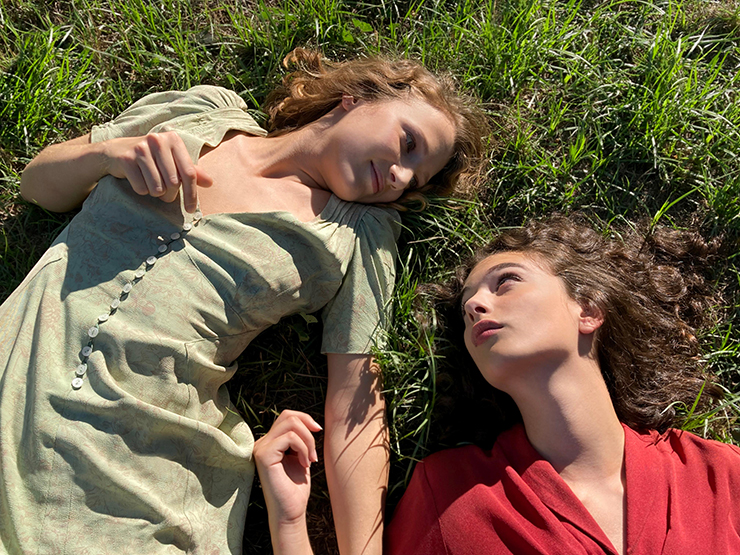
Yile Yara Vianello as Ginia and Deva Cassel as Amelia in a scene from "The Beautiful Summer." (Photo courtesy of True Colours)
Things are actually not so clearly defined for Ginia, who meets several of the male painters for whom Amelia poses in the nude and fumbles her way toward having a semblance of a sex life, all while yearning for her enigmatic new friend. But instead of finding her center, Ginia begins to spiral out of control, and it's here where “The Beautiful Summer” starts to lose its glow. The film starts becoming increasingly overheated, to the point where Ginia's self-destructive tendencies, fueled by her insecurities and self-loathing, unearth a streak that feels uncomfortably pious.
But Luchetti is eventually able to retake the reins and steer her film toward a resolution that feels cautiously optimistic. What keeps it afloat, interestingly enough, is not the central romance, but the relationship between Ginia and her brother, which never hits a false note. Their bond is “The Beautiful Summer's” secret weapon, and it gently guides the film to an understated, pleasing payoff. This is decent tea-and-crumpets fare with polished production values and pulsating bisexual energy.
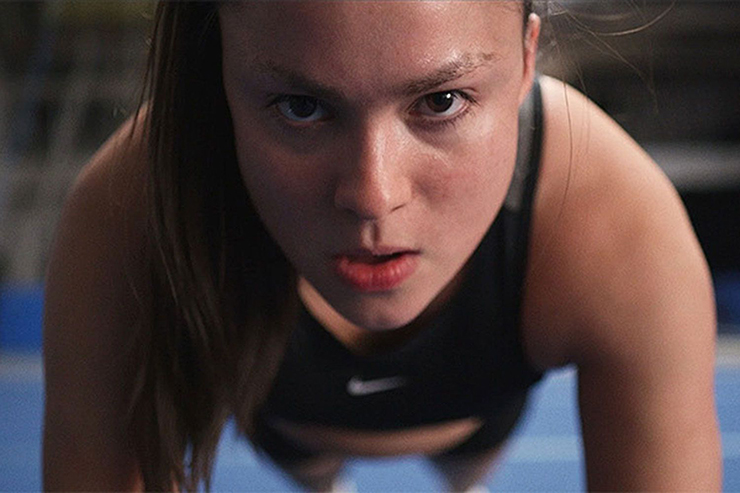
Devery Jacobs as Riley in a scene from "Backspot." (Photo courtesy of XYZ Films)
“Backspot”: Cheerleading is bloodsport in this taut, unnerving drama from Canada that deftly sidesteps sports movie conventions in favor of character-driven insight. The story kicks into gear when Riley (“Reservation Dogs'” Devery Jacobs) and her girlfriend Amanda (Kudakwashe Rutendo) both get picked for the Thunderhawks, their school's all-star squad. It turns out to be the toughest gig Riley ever loved, and her relationship's biggest hurdle to date.
Reminding the pair of what's at stake is Eileen (a shrewdly cast Evan Rachel Wood), the elite cheer team's no-nonsense coach, who zeroes in on what she feels is keeping Riley back performance-wise in the titular position. “You're making it look hard. You need to make it look easy,” Eileen points out.
Meanwhile, the teen couple's home life is a study in contrasts. Riley comes home to an aloof, unhappy mother (Shannyn Sossamon) and a father who remains faceless and out of reach, for Riley and the viewer. When Riley sleeps over at Amanda's, the warmth from Amanda's mom (Olunike Adeliyi) couldn't be more removed from the coldness waiting for her at home. Rounding out the cast is Thomas Antony Olajide, quietly arresting as the team's assistant coach, a good cop to Eileen's bad cop.
As the pressure to deliver results heightens, Riley's obsessive determination to succeed (and earn her coach's approval) starts consuming her, and it's not long before we start feeling her crippling anxiety.
It's disquietingly conveyed by Riley's habit of tearing out her eyebrow hairs, bringing “Backspot” close to body horror without quite taking the plunge.
Working from an observant screenplay by Joanne Sarazen, director D.W. Waterson peppers the film with montages of athletic bodies pirouetting and jumping but stops short of fetishizing these young women. The filmmaker, who has web series, shorts and music videos under her belt, displays verve and confidence in her feature directing debut. More importantly, she refuses to romanticize the sport or portray her protagonist as a role model. Riley's resolve yields off-putting mood swings, but her imperfections make the character more fascinating.
There is a point, “Backspot” underscores with a tightly coiled unease that matches Riley's, where dedication and drive stop being beneficial and start becoming harmful. This could have easily turned the film into a chore, but at 93 minutes, it flies by. Your nerves might be more than a bit frazzled by the time it loosens its grip.
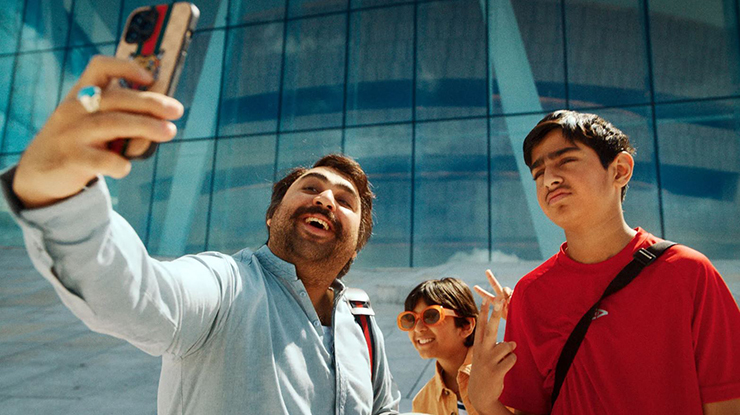
Asim Chaudhry as Uncle Ji, Liza Haider as Alia and Ahmed Mohammed as Mahmoud in a scene from "Listen Up!" (Photo courtesy of Motlys)
“Listen Up!”: It's not easy moving to a different country in search of better quality of life, but when the countries are as different as Pakistan and Norway, those cultural differences are more like vast canyons. Director Kaveh Tehrani risks alienating a queer audience by telling this immigrant family's story from the hetero older son's point of view, but stick with him, because the Norwegian-Iranian filmmaker knows what he's doing.
“Listen Up!” (Hør her'a!”) starts out in wild and wacky fashion, as Mahmoud (Ahmed Mohammed) gives viewers a tour of his Oslo neighborhood and introduces him to his friends and family. Tilted angles, poop humor, fourth wall breaking and brisk cross-cutting ensue, much like a film from Pakistan would look and feel like. The comic book sensibility ought to be obnoxious, but the movie remains sprightly and light on its feet.
Mahmoud is hit with a bit of bad news: his Uncle Ji (Asim Chaudhry) is coming to stay for the summer, which means he's going to have to play tour guide. This is a total buzzkill, especially because Mahmoud wants to pursue his neighbor Arisha (Selma Salim Rafique), who may or may not be interested in a gawky teen with braces and a unibrow.
Gradually coming to the surface after being introduced as a minor character is Ali (Liza Haider), Mahmoud's 9-year-old sibling. I say “sibling,” because while Ali was born in the body of a boy, she insists she's a girl. So it's Alia, not Ali. Fashion play dates with Arisha and a run-in with the local Pride parade only strengthen her resolve.
As for how this South Asian family will cope with and process the child's certainty about her gender identity, this is where “Listen Up!” starts, almost imperceptibly, to morph from a broad comedy to a thoughtful dramedy that feels uncannily Scandinavian. It reminded me of the films of Swedish director Lukas Moodysson (“Together,” “We Are the Best!”) in its refusal to vilify anyone. Its portrait of acceptance might hardly be novel, but the feel-good trans tale that Tehrani has concocted is never less a breath of fresh air. It marches to the beat of its bicultural drum.
- “The Beautiful Summer” and “Bonus Track” play Thursday, April 25, at 5 p.m. and 7:30 p.m.
- “Sunflower” plays Friday, April 26 at 5 p.m.
- “Backspot” plays Saturday, April 27, at 7:15 p.m.
- “Listen Up!” plays Sunday, April 28 at 4 p.m.
All of the above films will be showing at Regal South Beach, 1120 Lincoln Road, Miami Beach.
- “The Beautiful Summer” will also be available virtually from April 29 to May 5.
More information at outshinefilm.com.




